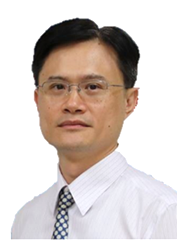Abstract
Integration of microfluidic control and electrochemical biosensors has attracted wide interests in the fields of biomedical diagnostics, environmental monitoring and food safety. The miniature electrochemical biosensors have great promise for the point-of-care testing. Electrochemical detectors have the advantage of easy production on a massive scale and good electrical compatibility, making them particularly well-suited to the construction of miniature diagnostic and detecting systems. Prof. Ching-Chou Wu’s lab have applied electrochemical sensing techniques, AC electrokinetic control and microfabrication techniques to develop three categories of lab-on-a-chip-based electrochemical biosensing devices, (1) capillary electrophoretic and chromatographic chips of integrating Au or copper-based amperometric detectors for the detection of dopamine, catechol, cations and amino acids; (2) impedimetric affinity-based biosensors with the aid of AC electrokinetic flow or immunomagnetic beads for rapid and sensitive detection of virus RNA, salbutamol and antibodies; (3) cell-based chips for the estimation of cellular respiratory and acidification. The lab-on-a-chip-based electrochemical biosensors can supply rapid and ultrasensitive sensing properties and easy operation for the applications of biomedical diagnostics and food safety.
Ching-Chou Wu, Ph. D. (吳靖宙特聘教授)
Department of Bio-industrial Mechatronics Engineering,
National Chung Hsing University
 Ching- Chou Wu, Ph. D. (吳靖宙)
Ching- Chou Wu, Ph. D. (吳靖宙)
Distinguished Professor
E-mail: ccwu@dragon.nchu.edu.tw
Department of Bio-industrial Mechatronics Engineering,
National Chung Hsing University (NCHU)
Dr. Ching-Chou Wu is a distinguished professor in the Department of Bio-industrial Mechatronics Engineering (BIME), National Chung Hsing University (NCHU) since 2018. He received his PhD degree from the Institute of Biomedical Engineering, National Cheng-Kung University, Taiwan in 2003. Then, he served as a postdoctoral fellow in Prof. Tomokazu Matsue’s group in Tohoku University, Japan (2003/10-2005/01). Dr. Wu joined NCHU in 2005 as an Assistant Professor, and promoted to Professor in 2014. Dr. Wu was the Chair of BIME (2017/8-2020/7) and the President of Association of Chemical Sensors in Taiwan (ACST) (2018/7-2020/6). Dr. Wu has more than 48 peer-reviewed publications as well as 20 patents. He was a reviewer in MOST Department of Life Science and Department of Engineering and Technologies (2017/01-2019/12), and currently serves as the editorial board member of the journals, Critical Reviews™ in Biomedical Engineering and Biosensors. He is also the member of ACCS International Steering Committee.
His research interests are to develop potentiometric, amperommetric and impedimetric microsensors and integrating DC&AC electrokinetic control with electrochemical sensors for biomedical and agricultural applications. He is currently developing cell-based chips for the estimation of cellular respiratory activity and acidification rate, magnetic nanoparticle-based immunosensors, PCR-free genosensors, copper phosphate-based electrocatalytic chip integrated with paper-based chromatography.
Dr. Wu is the winner of Distinguished Lectureship Award of Chemical Society of Japan (2008), 6th Asian Conference on Electrochemistry (2008) Best Poster Award, ACST Distinguished Paper Award (2006, 2007, 2012, 2013), 2012 Asia Bioceramics Symposium Best Poster Award, 2013 Taiwan Comprehensive University System Excellent Award, 65th Annual Meeting of the International Society of Electrochemistry Best Poster Prize (2014), Excellent Award of 5th SPINTECH Technology Thesis Award (2019) and more than 43 domestic conference awards.
